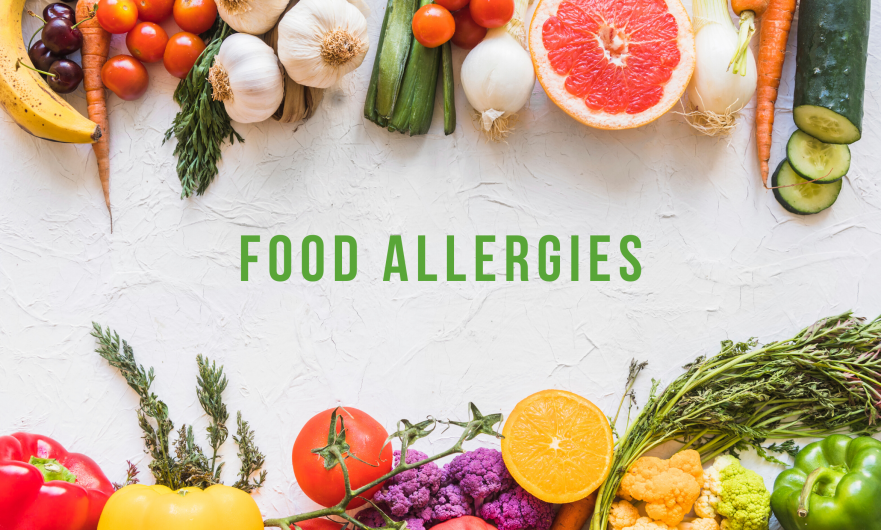Food allergies and food sensitivities (also known as intolerances) are terms often used interchangeably. However, they are technically different. When you have a food allergy, the reaction is triggered by your immune system. If you have food sensitivity or intolerance, your digestive system causes the reaction.

Food Allergy
The immune system is your body’s defence against invaders like bacteria, fungus, or the common cold virus. You have a food allergy when your immune system identifies a protein in what you eat as an invader and triggers cells to release antibodies to fight it. The next time you eat even the smallest amount of that food, the antibodies sense it and signal your immune system to release a chemical called histamine, as well as other chemicals, into your bloodstream. These chemicals cause allergy symptoms.
Symptoms
Food allergy symptoms usually develop within a few minutes to two hours after eating the offending food. For some people, an allergic reaction to a particular food may be uncomfortable but not severe. In some people, a food allergy can cause severe symptoms or even a life-threatening reaction known as anaphylaxis. In extreme cases, even inhaling or touching a tiny amount of the allergen can trigger the allergic reaction.

Common symptoms of food allergy include:
- Tingling or itching in the mouth
- Skin reactions, like hives, swelling, itching or eczema
- Swelling of the lips, face, tongue and throat or other parts of the body
- Wheezing, nasal congestion or trouble breathing
- Digestive symptoms like abdominal pain, diarrhoea, or vomiting
- Dizziness, light headedness or fainting
- Anaphylaxis, a rare but life-threatening reaction, symptoms include constriction and tightening of the airways, difficulty breathing, wheezing, shock with a severe drop in blood pressure, rapid pulse, dizziness, loss of consciousness and even death.

If you have a food allergy, you may be at risk of anaphylaxis — even if past reactions have been mild. Learn how to recognize and respond to anaphylaxis. You may need to carry an epinephrine shot for emergency self-treatment.
Also, parents and caretakers of a child with food allergies must be trained to treat accidental ingestions. Self-injectable epinephrine must always be available, and parents and caretakers should know how to administer the injectable.
Causes
Eight foods account for 90% of food allergies:
- Shellfish
- Fish
- Eggs
- Soybeans
- Wheat
- Tree nuts
- Peanuts
- Milk
People who have food allergies must avoid the above.
The exact cause of food allergies is still unknown, here are a few possible causes:
- Hereditary: Many allergies tend to run in families, therefore there is an apparent genetic component.
- There is also evidence that some allergies are the result of exposure to a certain food or foods too early in life, before the immune system is fully developed. Many infants who are given cow’s milk instead of breast milk in the first month develop an allergic reaction; the same goes for children who are fed wheat, eggs, peanut butter, or other products before they are ready.
- Overconsumption of a food is thought to lead to allergies. This can occur at any age. Wheat, for example, is a common allergen in the U.S, because most people eat it at every meal and snack.

Food Sensitivities/Intolerance
Food sensitivities/intolerances refer to difficulty in digesting certain foods. One has food sensitivity/intolerance when one suffers digestive problems after eating certain foods. For example, lactose intolerance is when your body can’t break down lactose, a sugar found in dairy products. If a person has gluten intolerance, it means the body can’t break down gluten, a protein found primarily in wheat, barley and rye.
Symptoms
Symptoms of food intolerance tend to take longer to appear than symptoms of allergies. They are generally less serious and often limited to digestive problems. These can include:
- Abdominal cramps
- Gas and bloating
- Diarrhoea
- Constipation
- Headache
- Runny nose
- Dark circles under the eyes
- Fatigue
Causes
Foods most commonly associated with food intolerance include dairy products, wheat, corn, soy, chocolates, citrus fruits, artificial sweeteners and preservatives.

Most food sensitivities can occur at any time in a person’s life. The underlying causes of food sensitivities are as follows:
- Not having the right enzymes you need to digest a certain food.
- A lack of variety in the diet.
- Poor digestion and detoxification. Most people who have multiple food sensitivities have an underlying condition known as leaky gut syndrome. This means that foods are not being broken down effectively, and once absorbed, they cause a heightened immune reaction. The key to this is to heal the gut lining and improve digestion of food.
- Sensitivity to food additives or preservatives, artificial colourings or other chemicals.
- Genetics are often the underlying cause.
Tests & Diagnosis
Use the elimination diet to determine which food or foods cause reaction. If you have a reaction after eating a particular food, see your doctor to determine whether you have a food allergy or a food sensitivity (intolerance).
Also, specific testing on blood, or skin scratch by a doctor can help you quickly identify problem foods. They can be avoided or you can desensitize yourself to them.
Treatment Diet
Obviously, the most important step in treating allergies is identifying them. Once you have identified the offending substances, keep them out of your diet and it will reduce your chances of having a bad reaction.
Food sensitivities can generally be improved or cured by rotating foods in the diet, improving digestion and detoxification. This is the reason why going on Dr. Lynn Tan’s Detoxification & Rejuvenation Programme (DRP) once or twice a year is highly recommended to allow your body time to rest, detoxify and rejuvenate. The DRP can also be helpful for certain kinds of allergies.
Recommended Food
Fortify your immune system with a healthy, and wholesome diet. Eat foods that are high in immune-building nutrients: seeds, green leafy vegetables and nutritional yeast for B vitamins; and plenty of fresh fruits and vegetables for vitamin C.
A varied diet will discourage the development of allergies, so try to eat different foods every day.
Breast milk is best for infants. If, for some reason, you are unable to provide your baby with mother’s milk, goat’s milk is a better option compared to cow’s milk, and you may use yoghurt or spirulina drink instead for more nourishment.
Drink a glass of distilled water every two waking hours to flush allergens out of your body and to encourage overall health.
Food to Avoid
Of course, you must avoid the foods that trigger a severe allergic response. In general, it is best to buy whole foods and prepare them yourself, so that you are aware of their content, but if you must buy packaged food, learn how to read labels and scrutinize them carefully. Food preservatives and artificial colourings or flavourings can be the root cause of food reactions.
Food sensitivities can generally be rotated in the diet, until you become desensitized to the offending food.
Improving Digestive Health
Improving the health of your digestive system by eliminating offending foods, having a consistent eating schedule, and taking a few essential nutritional supplements will have huge impact on the long-term health of your body. Here are a few nutritional supplements that are particularly helpful for improving digestive health:

- N.Zimes PA PlusTM: 2 teaspoons 4x daily. 3x after meal and 1x on empty stomach. Helps with digestion.
- Immuflora®: 1 sachet 30 minutes after every meal. Good bacteria favourably alter the way the immune system perceives food and also help with metabolism and digestion.
- B Complex: 1 tablet 3x daily after each meal. Supports adrenal gland function and allergy control.
- Liverin: 1 capsule 3x daily after each meal. Supports liver function and detoxification.
- C Complex: 1 tablet 3x daily. Reduces allergic reactions.
- Niacin: ½ tablet 3x daily (after a week, increase to 1 tablet. Increase to 2 tablets the following week.) Promotes blood circulation and improves immunity. (Contraindications: Those with hepatic insufficiency, hepatitis, or hepatic cirrhosis should receive a maximum of 500mg daily. Patients with a history of bleeding ulcers, or gastritis, and patients concurrently receiving prednisone, other steroids, or coumadin should not take niacin. Not to be taken during menses or bleeding.)
- Flax Seed Oil: 2 tablespoons daily. Reduces inflammation.
- Coffee Enema: Once or twice daily. To reduce toxins and allergens in the blood.

Elimination Diet to Detect Food Allergies
Although it takes time and dedication, an elimination diet is the best way to uncover any hidden food allergies. The first step is to come up with a list of possible trigger foods. Do this by keeping a food diary, writing down everything you eat each day for a week (or longer, if you sense that one week cannot adequately represent your eating habits). At the end of the week, note which foods you have consumed most often during the week. This is your list of possible triggers.
Next, you should eliminate all the suspect foods on your list from your diet for a total of two weeks. For many people, this stage is difficult, as you are asked to give up the foods you love and rely upon the most; try to keep in mind that you will be able to return to your usual diet, perhaps with a few modifications, soon.
If, after two weeks, your symptoms have disappeared, you know that you are allergic to at least one of the foods on your list. To identify which food or foods is the culprit, reintroduce the suspect foods to your diet one at a time. When reintroducing foods that have been eliminated, be sure to use the purest form of the food. For example, if milk is on your list of suspects, add whole milk back to your diet, not skim. If you have eliminated wheat, reintroduce it by eating cream of wheat or shredded wheat. Allow two full days to pass between reintroducing foods, as it may take a while for symptoms to manifest themselves. Should your symptoms reappear, you can assume that the food most recently introduced is an allergen, and you should banish it from your diet or work to have your immune system desensitized to it. Continue to make your way through the list as you may be allergic to more than one food. Wait at least 48 hours after the onset of symptoms before reintroducing the next eliminate food.
At the end of the elimination diet, you will know which, if any, foods produce an allergic response in your body. Depending on your reaction, you can avoid or reduce your intake of this food.

